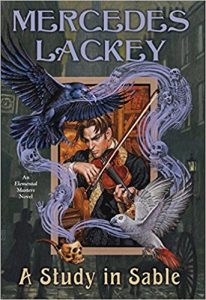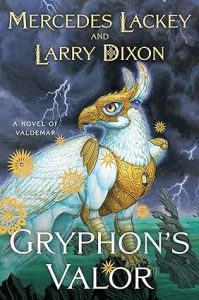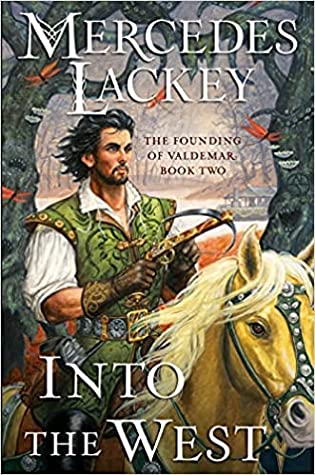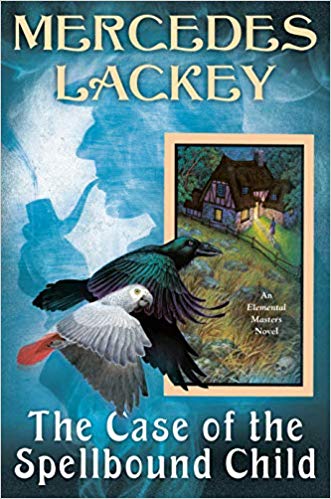 Feuds (Tales of Valdemar#18)
Feuds (Tales of Valdemar#18) by
Mercedes Lackey Format: eARC Source: supplied by publisher via NetGalley Formats available: paperback, ebook
Genres: anthologies,
epic fantasy,
fantasy Series: Tales of Valdemar #18,
Valdemar (Publication order) #59 Pages: 368
Published by DAW on November 26, 2024
Purchasing Info: Author's Website,
Publisher's Website,
Amazon,
Barnes & Noble,
Kobo,
Bookshop.org,
Better World Books Goodreads This 18th anthology of short stories set in the beloved Valdemar high fantasy universe features tales by debut and established authors and a brand-new story from Mercedes Lackey.
The Heralds of Valdemar are the kingdom's ancient order of protectors. They are drawn from all across the land, from all walks of life, and at all ages—and all are Gifted with abilities beyond those of normal men and women. They are Mindspeakers, FarSeers, Empaths, ForeSeers, Firestarters, FarSpeakers, and more. These inborn talents—combined with training as emissaries, spies, judges, diplomats, scouts, counselors, warriors, and more—make them indispensable to their monarch and realm.
Sought and Chosen by mysterious horse-like Companions, they are bonded for life to these telepathic, enigmatic creatures. The Heralds of Valdemar and their Companions ride circuit throughout the kingdom, protecting the peace and, when necessary, defending their land and monarch.
Join a variety of authors as they ride with Mercedes Lackey to the beloved land of Valdemar and experience the many facets of this storied high fantasy realm.
My (very long) Review:
The individual volumes in the long-running Tales of Valdemar series (this is the EIGHTEENTH collection!) each center around a theme. The theme of this one is clear – as it says so right there on the label. Each of the stories herein centers on a feud. Not a battle, not a war, but a feud.
Think of the infamous Hatfields and the McCoys, names that we only still recognize because they had, you guessed it, a feud that lasted so long it made it into history and legend.
 Feuds are usually not fun – and a lot of these stories are not. The collection is very good, but it isn’t nearly as lighthearted as the Shenanigans collection. Howsomever, there is still plenty to savor for repeat visitors to this fascinating world, while newcomers are sure to find something that will leave them thirsting for more – even if it’s not another story about food and drink as there are several of those in this year’s mix!
Feuds are usually not fun – and a lot of these stories are not. The collection is very good, but it isn’t nearly as lighthearted as the Shenanigans collection. Howsomever, there is still plenty to savor for repeat visitors to this fascinating world, while newcomers are sure to find something that will leave them thirsting for more – even if it’s not another story about food and drink as there are several of those in this year’s mix!
I picked this up because Valdemar is a world I knew I could slip into and be comforted as well as entertained – even though the theme of the collection isn’t necessarily comforting at all. And that’s exactly what happened.
Because I had such a good time – and ripped right through the whole thing without even bothering to come back to the ‘real world’ until I was finished, this is one of those times when each story is going to get a rating of its own and then I’ll attempt some very fudgy math to rate the whole.
“The Price of Anger” by Brigid Collins
This was a great story to kick off the collection of feuds because it’s a story about the costs of feuding. It’s also a story on two levels, as a young Farseer keeps seeing the ghosts of earlier students feuding while she dodges current students who can’t stop trying to exploit her gift. It’s only when she sees the results of the old feud that she understands that she’s falling into the same trap. Escape Rating A-
“Consequences” by Dylan Birtolo
It’s a stupid feud and an even stupider fight. Not that the story is remotely stupid, but the reader gets the same urge as the Herald – to knock some heads together in the hopes that some sense will break loose. It’s only when we see how things got this way, that a good idea once upon a time is having terrible consequences in the present that we see exactly how this particular road to hell got paved. Escape Rating B because it takes a bit to figure out that we’re seeing the story peel back in history for the point to come through.
“A Bad Business” by Jeanne Adams
A direct follow-up to the book Take a Thief (which I admit I have not read yet), this is a story about what happens in the aftermath of a horrific case. Just because the central villain has been removed from the equation it doesn’t mean that there aren’t still a whole lot of dirty loose ends to clean up. Even though I hadn’t read the case being wrapped up, this story is complete in itself and an appropriately messy clean up to a horrific case. Escape Rating B+
“A Tale of Two Cooks” by Charlotte E. English
This was one of the few relatively light-hearted stories in this collection and it made a refreshing change from the darker stories. Not that this couldn’t have turned dark as well, as it’s a case of too many cooks deliberately spoiling the soup – and the rest of the meal – in ways that could have been deadly. But the poisonous plans of the feuding foodies are thwarted by the quick decisions of one smart and able assistant and her cousin – a savvy Herald. Escape Rating A- because of the excellent way it relies on wits and banter to see its way clear to the solution.
“A Bite and a Pint” by Louisa Swann
Home may be the place that when you have to go there, they have to take you in. But that doesn’t mean they have to listen to you, not even when you come home after a year’s absence as a Herald Trainee on your way to the Collegium in Haven. A feud has broken out between the new Brewmistress of Petril’s tiny village and, unfortunately for him, his own mother. Each believes the other woman has poisoned her best goods, and it’s up to a boy that no one is quite yet willing to acknowledge is a man to find his way to the truth. This was another light story, the solution wasn’t really a surprise but it was a lot of fun getting there. Escape Rating B+
“Dueling Minstrels” by Jennifer Brozek and Marie Bilodeau
This is one of several stories about minstrels and minstrel rivalry in the collection. Minstrels Ozan and Aimar bring out both the best and the worst in each other. The worst behavior, and the best of their Bardic Gifts. But those gifts, combined with their ever-present feud, threaten to set their town literally on fire if they can’t find a way to make their rivalry work for them instead of against each other. Escape Rating B
“A Scold of Jays” by Elisabeth Waters
This is a story about karma being a right bitch – and deservedly so. A nobleman basically throws away his older son after an injury that will leave him with a limp – and not a single bit of other damage. That the nobleman disowns this boy as useless while continuing to indulge his self-indulgent, utterly villainous and downright murderous younger son results in exactly the situation one would hope for. Everyone involved gets EXACTLY what they deserve – many times over. This story is a direct follow-up to one that appeared in the earlier collection, Shenanigans, “A Cry of Hounds” and is even more fun as the karma continues to flow exactly where it should. Escape Rating A.
“Future-Proof” by J.L. Gribble
The feud in this particular story is a tragedy based on a fraud – with two young men paying the price for their elders’ evil deeds. Duri Phran and Cam Aylmer are both persona non grata among the unaffiliated noble students in the Collegium, forced to pretend to hate each other to keep their respective families from punishing them further. It’s only when they’re forced to work together that they realize that there is more wrong in both of their terrible situations that either imagined – and that salvation is waiting for them both if they can just manage to reach beyond what they’ve been taught. I had mixed feelings about this one because the ending felt a bit more deus ex companion than I wanted so Escape Rating B
“A Single Row of Vines” by Brenda Cooper
The setup for this story is similar to the one in Future-Proof, but this time it’s two young women on opposite sides of a village feud who are afraid to put that feud aside as Herald Trainees in Haven. This one worked better for me because the Companions refuse to solve their humans’ problem, instead the girls have to work it out in spite of the tremendous amount of indoctrination they’ve heard for their entire lives. Two girls alone can’t end 40 years of feuding – but they can make a start – and they do. Escape Rating A-
“Most True” by Kristin Schwengel
This one combines the minstrel rivalry of “Dueling Minstrels” with the “consequences” of the story of the same name. In this story, however, it’s those consequences that bring about the ending of the feud, as two gifted bards learn that they are only gifted enough to reach mastery if they reach for it together, and only AFTER the consequences of their feud have nearly ended one if not both of their careers before they’ve truly begun. Escape Rating B.
“Detours and Double Crosses” by Angela Penrose
A story about the cleverness of Bards, the foolishness of people who try to use those Bards in their own nefarious schemes and the stubbornness of one Bard Trainee who proves to herself that she’s more than good enough to become a full bard by saving a young heir from a deadly plot by chasing a villain down no matter how fast he runs. This story was typical of these collections in all the best ways and I fell right into it. Escape Rating A-
 “Trade is Trade” by Fiona Patton
“Trade is Trade” by Fiona Patton
As an earlier story was all about food – it’s fitting that this one is all about drinks. Or at least the bragging rights thereto. The feud is entirely predictable – as are the results. The Crown is planning to give a plaque to the oldest pub in Haven. The Guards really, really, really want the Crown to get on with it, because the rash of trouble-making and sign-stealing is driving them to more drink than they can collectively afford. As this story reminds me a great deal of the Discworld City Watch subseries AND it’s a loose follow-up to one of my favorite stories in the Anything with Nothing collection, “Look to Your Houses”, Escape Rating A.
“By the Ticking of My Thumbs” by Rosemary Edghill
A really interesting take on feuding as the feud is, literally, all in their heads. There’s no precipitating event, no history, and the participants have never even met. But they really, really should have. The whole feud is based entirely on their assumptions about each other, and those assumptions have thoroughly made asses out of both of them. It’s sad but fascinating to watch them assign motives to each other that have no basis in anything – and such a beautiful catharsis when they finally figure out where they both went so terribly wrong. Escape Rating A.
“Harmony” by Anthea Sharp
Another story about feuding, dueling bards, there isn’t much harmony in this story – which is the point. Because this is very much a story about pride going before a really, really big fall, and how beautiful music can only be made out of, well, harmony. Not just the harmony of the notes and the melody, but the harmony among the people – ALL THE PEOPLE – who take part in the performance. That age and experience manage to outwit youth, skill and hubris added just the right bit of tartness to an excellent story. Escape Rating A
“Playing Peacemaker Once More” by Dee Shull
Considering the title, it’s a bit of a surprise that this is actually a story about boundaries. Specifically about defending one’s own even as one does their best to get others to examine the placement of theirs. Like the final story in this collection, Uncivil Blood, there’s a bit of a Romeo and Juliet aspect – or perhaps that should be Romeo and Tybalt – to this one that gets worked out much better than Shakespeare’s famous tragedy. Escape Rating B
“Pairmates” by Ron Collins
This one didn’t quite work for me, which I was really sad about as it’s the one story in this collection that features nonhuman protagonists. I think it just passed me by a bit because I couldn’t place it in Valdemar history and wasn’t quite sure how it fit to the overall world or when. I wanted to like it more than I did but I had too many nagging questions at the end. Escape Rating C.
“Battle of the Bands” by Dayle A. Dermatic
This battle of the bands is a family feud, as brothers Eldriss and Davon haven’t spoken to each other in years because Davon claimed that Eldriss stole his sweetheart and married her. Beyond the fact that Shalna isn’t an object to be stolen, that claim is more of an excuse than a reason. Eldriss just wants his brother back, and a mixup at a musical contest – where the brothers enter as the leaders of competing bands – gives them the opportunity they’ve been waiting for for over a decade. A good story with a happy but not surprising ending. Escape Rating B.
“Tangles” by Diana L. Paxson
The feud in this particular instance is a feud between rival shopkeepers who are determined to keep far away from each other in spite of being located in the save Haven district. However, this is also a story about two determined – and somewhat magical – pieces of furniture that make a matched set that are equally determined to be put back together. To the point where they throw a bit of magic in the way of the best person to untangle a web that goes back decades. There are several Romeo and Juliet-type stories in this collection and this one is another, but it’s marvelously twisted because the feud happened because they didn’t marry – although it’s still not too late to fix things the way they should have been! Escape Rating A
“Payment in Kind” by Stephanie Shaver
The title is in reference to what happens when a cheating landholder stiffs a bard for her fee. But underneath that is the saddest story in this collection on multiple fronts as the problem set before that bard and her Herald twin-brother is about a whole village being oppressed by that rapacious landholder – who is also a liar and a cheat – a healer caught between her oaths and her duty, child labor and child murder, and one woman with cancer who wants one last day in the sun – even as she keeps her condition a secret from those she loves the most. Escape Rating A+.
“A Determined Will” by Paige L. Christie
This is a story about going home and discovering that the things you remember aren’t quite what you thought they were – unless they are and someone is trying to swindle you. This one was surprisingly fun in spite of itself, as Guard Trainee Teig has come home to bury the closest thing she had to a father. That he left her everything he had isn’t really the point – it’s more of the last note of a memory. But when someone arrives out of nowhere and attempts to cheat her out of it, she puts all of that Guard training to excellent use! Escape Rating A.
“The Ballad of Northfrost” by Phaedra Weldon
This is a hard, bitter story with an excellent satisfying ending. Reyes fate reads like many of the videogames I love. He’s wounded, near death, in the dark, between a rock and a very hard place, determined to get justice for people long dead who once saved him and set him on his path. That his own ghosts rise to help him take the final steps to safety, freedom and resolution was a bright candle in a very dark story with just the right and necessary ending. Escape Rating A+
“Uncivil Blood” by Mercedes Lackey
A much better version of Romeo and Juliet, with more political shenanigans, considerably fewer deaths, a more sensible ending, and the reappearance of one of Valdemar’s favorite characters who has not graced the stage for entirely too many years. This was my favorite story in the collection, Escape Rating A+.
Escape Rating Overall A-: This was as grand a trip to Valdemar as I hoped it would be. My favorite story in the collection was “Uncivil Blood” by Mercedes Lackey herself, followed by “The Ballad of Northfrost” by Phaedra Weldon and “Payment in Kind” by Stephanie Shaver. If you’ve EVER visited Valdemar this is a great time and a great way to go back for a return trip!
 Miss Amelia's List (Elemental Masters Book 17) by Mercedes Lackey
Miss Amelia's List (Elemental Masters Book 17) by Mercedes Lackey  While this entry in the Elemental Masters series is number 17 in publication order, this series of magical retellings and reinterpretations of classic myths, legends, tales and historical events has not been published in ANY chronological order. The previous book in the series, The Silver Bullets of Annie Oakley, is set in the late 19th century. Annie Oakley wasn’t even born until 1860 – long after the events of Miss Amelia’s List take place.
While this entry in the Elemental Masters series is number 17 in publication order, this series of magical retellings and reinterpretations of classic myths, legends, tales and historical events has not been published in ANY chronological order. The previous book in the series, The Silver Bullets of Annie Oakley, is set in the late 19th century. Annie Oakley wasn’t even born until 1860 – long after the events of Miss Amelia’s List take place. So not a lot happens because it’s her ‘job’ in effect to make sure that it seems like not a lot is happening. Even if, or especially because, the reality is that a lot is getting done. Which again, gets back to the story being charming and lovely and a delight to sink into much like a warm bath, BUT not exactly a page-turner.
So not a lot happens because it’s her ‘job’ in effect to make sure that it seems like not a lot is happening. Even if, or especially because, the reality is that a lot is getting done. Which again, gets back to the story being charming and lovely and a delight to sink into much like a warm bath, BUT not exactly a page-turner.
 Feuds (Tales of Valdemar#18) by
Feuds (Tales of Valdemar#18) by  Feuds are usually not fun – and a lot of these stories are not. The collection is very good, but it isn’t nearly as lighthearted as the
Feuds are usually not fun – and a lot of these stories are not. The collection is very good, but it isn’t nearly as lighthearted as the  “Trade is Trade” by Fiona Patton
“Trade is Trade” by Fiona Patton Valdemar (The Founding of Valdemar #3) by
Valdemar (The Founding of Valdemar #3) by  This final book in the
This final book in the  Escape Rating A: Valdemar has always been a bit of an anomaly as far as fantasy worlds go. Most epic fantasies are set at times and in places that are in so much turmoil that that are just no nice places to visit and you really wouldn’t want to live there. There are a few exceptions, like Pern, Celta and Harmony, but for the most part, by the time that an epic fantasy series gets written about a place – or epic space opera or a combination thereof – the situation has gotten so FUBAR that liveability is a long way off even by the series’ end.
Escape Rating A: Valdemar has always been a bit of an anomaly as far as fantasy worlds go. Most epic fantasies are set at times and in places that are in so much turmoil that that are just no nice places to visit and you really wouldn’t want to live there. There are a few exceptions, like Pern, Celta and Harmony, but for the most part, by the time that an epic fantasy series gets written about a place – or epic space opera or a combination thereof – the situation has gotten so FUBAR that liveability is a long way off even by the series’ end. It is generally a two-steps forward, one-step back proposition. We know that sausage is going to be fairly tasty by the time it reaches Queen Selenay in
It is generally a two-steps forward, one-step back proposition. We know that sausage is going to be fairly tasty by the time it reaches Queen Selenay in  The tributes to Sydney-You-Asshole’s death were many and heartfelt, particularly deeply touching to the heart of any reader who has a beloved companion animal that is gone. There is still dust in this review as I write about it – so be prepared.
The tributes to Sydney-You-Asshole’s death were many and heartfelt, particularly deeply touching to the heart of any reader who has a beloved companion animal that is gone. There is still dust in this review as I write about it – so be prepared. Anything With Nothing (Tales of Valdemar #17) by
Anything With Nothing (Tales of Valdemar #17) by  Escape Rating A-: The previous
Escape Rating A-: The previous  Many of the stories in this collection take place either as magic was fading or after it was already gone. In other words, in the run up to the
Many of the stories in this collection take place either as magic was fading or after it was already gone. In other words, in the run up to the  Last but not least, there are several marvelous stories in this collection that would have been equally at home in
Last but not least, there are several marvelous stories in this collection that would have been equally at home in  Shenanigans (Tales of Valdemar, #16) by
Shenanigans (Tales of Valdemar, #16) by  Last week’s
Last week’s  Into the West (The Founding of Valdemar, #2) by
Into the West (The Founding of Valdemar, #2) by  Escape Rating B: If you’ve read
Escape Rating B: If you’ve read  The Silver Bullets of Annie Oakley (Elemental Masters, #16) by
The Silver Bullets of Annie Oakley (Elemental Masters, #16) by  The Wolves – whose identity has never been conclusively determined – starved her, cheated her, threatened her and physically and mentally abused her at every turn for two years, beginning when Annie was nine years old.
The Wolves – whose identity has never been conclusively determined – starved her, cheated her, threatened her and physically and mentally abused her at every turn for two years, beginning when Annie was nine years old.
 Boundaries (Tales of Valdemar #15) by
Boundaries (Tales of Valdemar #15) by  Beyond (The Founding of Valdemar #1) by
Beyond (The Founding of Valdemar #1) by  The Case of the Spellbound Child (Elemental Masters, #14) by
The Case of the Spellbound Child (Elemental Masters, #14) by  Escape Rating B+: If you look carefully at the background image in the book cover, you’ll recognize the silhouette of the famous detective, complete with pipe and just the suggestion of a deerstalker cap. It does lead one to believe that there will be more of Holmes than actually occurs in this case. On the other hand, there’s plenty of Watson, or rather, Watsons in this one, as the Wizard of London has tasked the Watsons with a case that he finds more important than the locals seem to.
Escape Rating B+: If you look carefully at the background image in the book cover, you’ll recognize the silhouette of the famous detective, complete with pipe and just the suggestion of a deerstalker cap. It does lead one to believe that there will be more of Holmes than actually occurs in this case. On the other hand, there’s plenty of Watson, or rather, Watsons in this one, as the Wizard of London has tasked the Watsons with a case that he finds more important than the locals seem to.